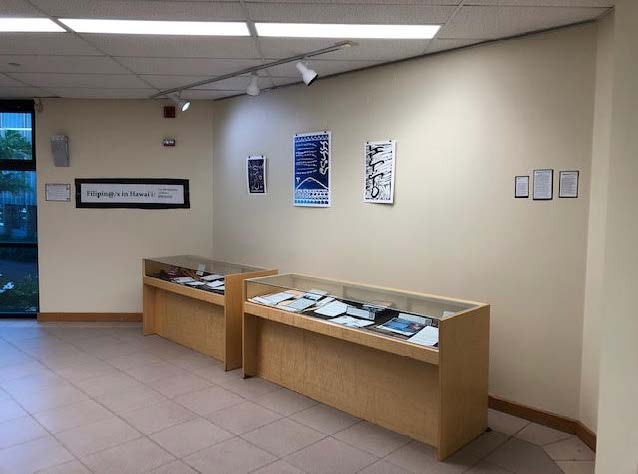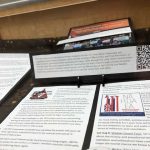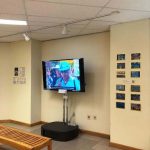A Digital Exhibit of Filipina/x in Hawaiʻi: Our Movements, Archives, & Memories

October 19, 2021-November 30, 2021
Location: Bridge Gallery
By Ellen-Rae Cachola, exhibit curator
The following information is available as a pdf
From October 19 to November 30, 2021, the University of Hawaiʻi at Mānoa Hamilton Library first floor Bridge Gallery is featuring “Filipina/x in Hawaiʻi: Our Movements, Archives, & Memories,” in observance of Filipino American History month. To visit this exhibit in person, public patrons must submit a research appointment on this form; enrolled UH students and working staff and faculty must show their UH ID card at the door. For those who are unable to visit the library, this information provides access to some of the digitized items featured in the exhibit.
This exhibit features Urban Babaylan, a Filipina/x community group based on Oʻahu, Hawaiʻi, that has committed to decolonization by responding to Indigenous movements in Hawai’i and in the Philippines. Members of Urban Babaylan mentored other community members to continue this work, leading to the creation of Women’s Voices, Women Speak (WVWS), Decolonial Pin@ys, among many organizations.
Read more about the herstory of the Urban Babaylan on eVols. View a Talk Story recording of exhibit contributors discussing the co-founding of these groups, the rhizomatic community organizing with Kanaka Maoli, Oceanic, LGBTQ+, and other marginalized community movements for decolonization and demilitarization, as well as articulating aspirations for education in Hawai’i, the Philippines, and internationally.
This exhibit offers some community-based and scholarly Filipin@/x diasporic research and dialogue with Kanaka Maoli principles and practices of living Aloha ʻĀina.
Against the wall, view visual art pieces of Ilaw, Kalayaan, and Kaluluwa, written in Baybayin, the Tagalog pre-colonial writing system. They also include batok designs used in traditional Ilocano and Cordillera tattooing (Created by Chris Lipat).
The left case features Philippine Indigenous cultural & art pieces, as well as items that document the formation of Urban Babaylan and Women’s Voices Women Speak.
- Urban Babaylan First Full Moon Gathering Email documents the first message to gather the group of Filipinas to intentionally respond to the Iraq war from their context in Hawaiʻi (Created by Grace Caligtan).
- V-Day Pinay Program and Proud to be Pinay essay documents a creative performance to break the silence on domestic violence in the Filipin@/x community (Created by Grace Caligtan)
- Hoʻomoʻomoʻo: Piecing Together Expressions of Resistance was a book of poems created by WVWS’s 2007 Delegation as a ho’okupu (gift) to participants of the International Women’s Network Against Militarism gathering in San Francisco (Courtesy of Ellen-Rae Cachola).

The right display case features some of the campaigns of Decolonial Pin@ys weaving the sovereignty struggles of Indigenous peoples of the Philippines and of Hawaiʻi.
- Decolonial Pin@y Principles documents the advocacy concepts that drives this group’s work (Courtesy of Ellen-Rae Cachola).
- Land is Life Action Book is a story and primer written to educate youth in Hawaiʻi about Indigenous land struggles in Mindanao, Philippines, and to inspire solidarities between island peoples (Courtesy of Reyna Ramolete).
- The Letters of Solidarity are between Hawaiʻi students from Farrington High School and Kamehameha Schools Kapālama Campus, and Mindanao students from the Alternative Learning Center for Agriculture and Livelihood Development (ALCADEV) and Tribal Filipino Program of Lianga Surigao del Sur (TRIFPSS), in Mindanao. The letters document the exchange between youth, learning/sharing about the attacks on Indigenous schools by militarization, and expressions of solidarity and support across their differences (Courtesy of Reyna Ramolete).
- Respect Land, Respect Labor flyer called for solidarity actions among Local 5/Aikea organizers and hotel workers to stand with the kiaʻi of Mauna Kea against the construction of the TMT during the Astronomy Convention in Waikīkī (Courtesy of Ellen-Rae Cachola).
- Decolonial Pin@y Talk Story on Settler Colonialism with University of Toronto Students covers how they understand the phenomenon of settler colonialism within their immigrant/settler families and communities (Courtesy of Chris Lipat).
- Dia De Los Muertos: In Memory of Jennifer Laude discussed the murder of a transgender Filipina at the hands of a U.S. Military personnel. The event aimed to be a ritual of grieving with other island peoples, such as the community of Kollin Elderts in Hawaiʻi, who faced death under heightened militarization of their lands (Courtesy of Chris Lipat).

The computer monitor plays an excerpt from a documentary “Women Against Militarism: Reclaiming Life, Land, & Spirit,” which covers the first Hawaiʻi delegation to the Philippines that began a relationship with other women’s peace movements in the region. After this international experience, WVWS was formed in Hawai’i.
- To the left of the monitor are quotes from Dean I. Saranillio’s chapter in Asian Settler Colonialism: From Local Governments to the Habits of Everyday Life in Hawaiʻi documenting Urban Babaylan’s testimony against military training at the Waikane Valley Hearing in 2003. These Filipinas modeled responsive leadership in Hawaiʻi by standing in solidarity with Kanaka Maoli seeking to defend their lands from U.S. military expansion.
- WVWS organizers published their findings from the International Womenʻs Network Against Militarism gathering in Okinawa in 2011 in Frontiers and Critical Ethnic Studies journals.
- To the right of the monitor features Lumad Bakwit Cards. These are art works created by Mindanao students from ALCADEV and TRIFPSS to advocate for the saving of their Indigenous schools and lands from military and corporate logging interests (Courtesy of Reyna Ramolete).
Acknowledgements
This exhibit is in memory of Bernadette “Gigi” Miranda
Exhibit Contributors
Ellen-Rae Cachola, Exhibit Curator
Sonya Zabala, Exhibit Contributor & Talk Story Director
Darlene Rodrigues, Exhibit Contributor
Chris Lipat, Exhibit Contributor & Installation
Reyna Ramolete Hayashi, Exhibit Contributor
Grace Caligtan, Exhibit Contributor
Kim Compoc, Talk Story Contributor
Adrian Alarilla, Talk Story Emcee and Video Editor
Jake Atienza, Exhibit Installation
Special Thanks
Margaret Joyce, Hawaiian Materials Cataloging/Metadata Librarian, Exhibits Committee
Patricia Brandes, Science and Technology Reference Librarian, Exhibits Committee
Sadie Rosen, Metadata Librarian
Daniel Ishimitsu, Web Developer
Elena Clariza, Philippine Studies Librarian
David Brier, Business Humanities & Social Sciences Librarian

